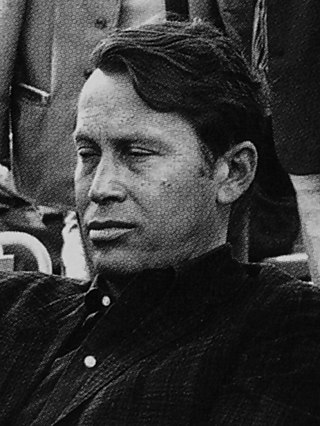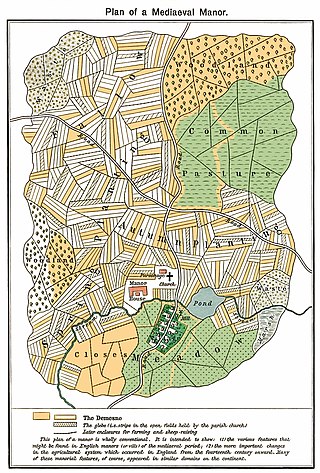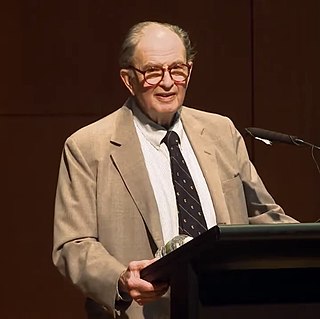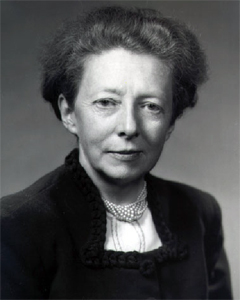
Richard Purdy Wilbur was an American poet and literary translator. One of the foremost poets of his generation, Wilbur's work, often employing rhyme, and composed primarily in traditional forms, was marked by its wit, charm, and gentlemanly elegance. He was appointed the second Poet Laureate Consultant in Poetry to the Library of Congress in 1987 and received the Pulitzer Prize for Poetry twice, in 1957 and 1989.

The open-field system was the prevalent agricultural system in much of Europe during the Middle Ages and lasted into the 20th century in Russia, Iran, and Turkey. Each manor or village had two or three large fields, usually several hundred acres each, which were divided into many narrow strips of land. The strips or selions were cultivated by peasants, often called tenants or serfs. The holdings of a manor also included woodland and pasture areas for common usage and fields belonging to the lord of the manor and the religious authorities, usually Roman Catholics in medieval Western Europe. The farmers customarily lived in separate houses in a nucleated village with a much larger manor house and church nearby. The open-field system necessitated co-operation among the residents of the manor.

Samuel Eliot Morison was an American historian noted for his works of maritime history and American history that were both authoritative and popular. He received his Ph.D. from Harvard University in 1912, and taught history at the university for 40 years. He won Pulitzer Prizes for Admiral of the Ocean Sea (1942), a biography of Christopher Columbus, and John Paul Jones: A Sailor's Biography (1959). In 1942, he was commissioned to write a history of United States naval operations in World War II, which was published in 15 volumes between 1947 and 1962. Morison wrote the popular Oxford History of the American People (1965), and co-authored the classic textbook The Growth of the American Republic (1930) with Henry Steele Commager.

Bernard Bailyn was an American historian, author, and academic specializing in U.S. Colonial and Revolutionary-era History. He was a professor at Harvard University from 1953. Bailyn won the Pulitzer Prize for History twice. In 1998 the National Endowment for the Humanities selected him for the Jefferson Lecture. He was a recipient of the 2010 National Humanities Medal.
Howard Mumford Jones was an American intellectual historian, literary critic, journalist, poet, and professor of English at the University of Michigan and later at Harvard University.

David Herbert Donald was an American historian, best known for his 1995 biography of Abraham Lincoln. He twice won the Pulitzer Prize for Biography for earlier works; he published more than 30 books on United States political and literary figures and the history of the American South.
Edmund Sears Morgan was an American historian and an authority on early American history. He was the Sterling Professor of History at Yale University, where he taught from 1955 to 1986. He specialized in American colonial history, with some attention to English history. Thomas S. Kidd says he was noted for his incisive writing style, "simply one of the best academic prose stylists America has ever produced." He covered many topics, including Puritanism, political ideas, the American Revolution, slavery, historiography, family life, and numerous notables such as Benjamin Franklin.
Perry Gilbert Eddy Miller was an American intellectual historian and a co-founder of the field of American Studies. Miller specialized in the history of early America and took an active role in a revisionist view of the colonial Puritan theocracy that was cultivated at Harvard University beginning in the 1920s. Heavy drinking led to his premature death at the age of 58.
The following are the Pulitzer Prizes for 1964.

Edmund Rice, was an early settler to Massachusetts Bay Colony born in Suffolk, England. He lived in Stanstead, Suffolk and Berkhamsted, Hertfordshire before sailing with his family to America. He landed in the Colony in summer or fall of 1638, thought to be first living in the town of Watertown, Massachusetts. Shortly thereafter he was a founder of Sudbury in 1638, and later in life was one of the thirteen petitioners for the founding of Marlborough in 1656. He was a deacon in the Puritan Church, and served in town politics as a selectman and judge. He also served five years as a member of the Great and General Court, the combined colonial legislature and judicial court of Massachusetts.
Roy Franklin Nichols was an American historian who won the 1949 Pulitzer Prize for History for The Disruption of American Democracy.

Constance Winsor Green, best known as Constance McLaughlin Green, was an American historian. She who won the 1963 Pulitzer Prize for History for Washington, Village and Capital, 1800–1878 (1962).
Sumner Chilton Powell was an American historian and history teacher at the Choate School, a college-prep boarding school in Wallingford, Connecticut.
Silas Bent Jr. was an American land surveyor, attorney, and jurist who served as a Judge of the Missouri Supreme Court from 1817 to 1821. His son, Charles Bent, was a fur trader and appointed as the first territorial governor of New Mexico during the United States invasion of Mexico in the Mexican-American War. Three of his other sons William, George, and Robert had been in business with Charles and built Bent's Old Fort and other outposts of trade in the American Southwest.

Peter Bent Brigham (1807–1877) was an American millionaire businessman, restaurateur, real estate trader, and director of the Fitchburg Railroad. He is best known as a philanthropist for his initial endowment of Peter Bent Brigham Hospital and the Brigham Academy in Bakersfield, Vermont.
Sumner is a given name. Notable people with the name include:
The culture of New England comprises a shared heritage and culture primarily shaped by its indigenous peoples, early English colonists, and waves of immigration from Europe, Asia, Africa, and the Americas. In contrast to other American regions, most of New England's earliest Puritan settlers came from eastern England, contributing to New England's distinctive accents, foods, customs, and social structures.

The literature of New England has had an enduring influence on American literature in general, with themes such as religion, race, the individual versus society, social repression, and nature, emblematic of the larger concerns of American letters.











